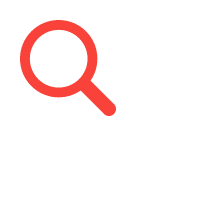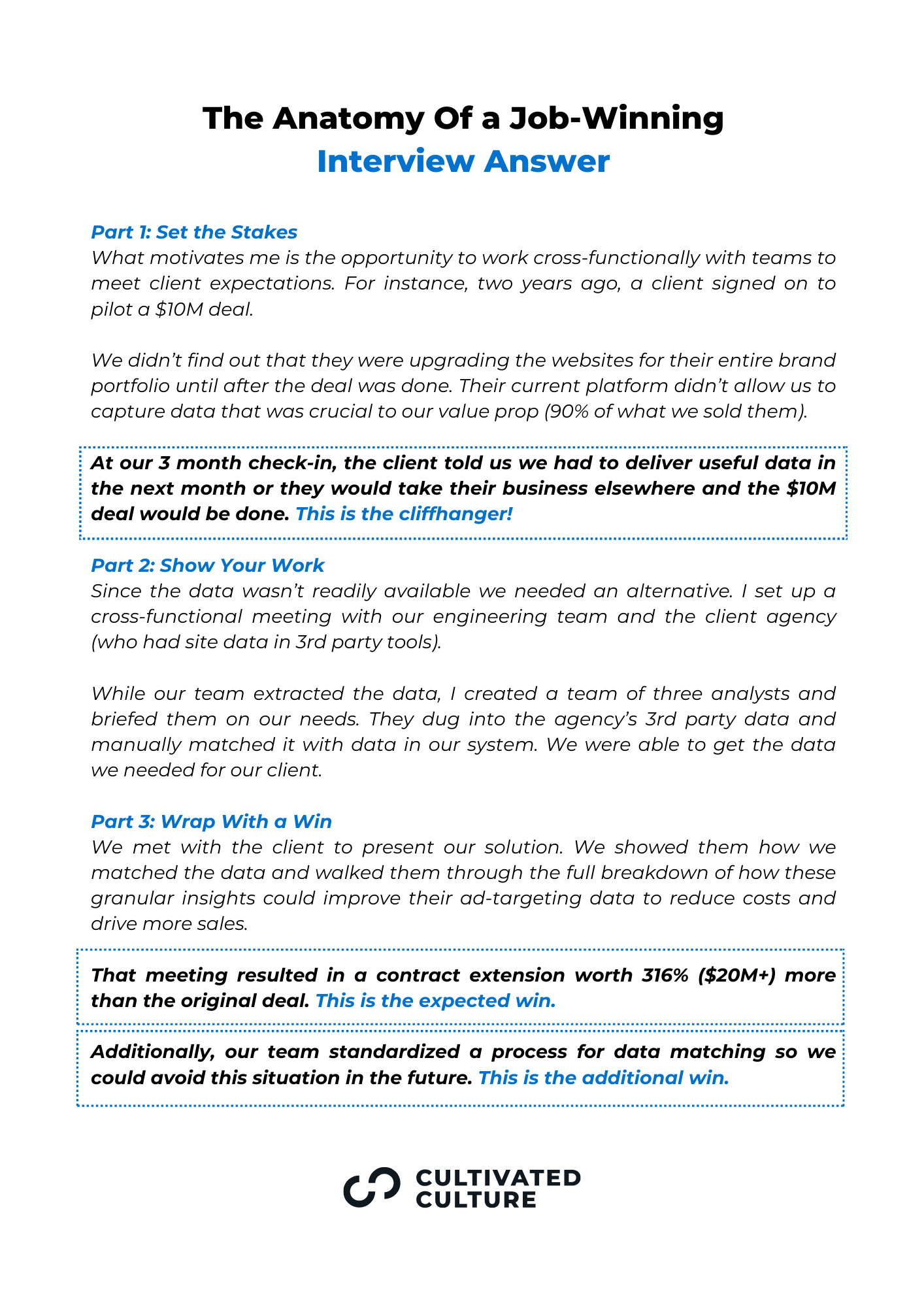Looking to ace the Software Engineer interview questions for the role you are applying for?
Then you’ll need to start gearing up!
Some questions addressed during interviews are universal for any role. They’re usually questions like:
- Why do you want to work here?
- What is your greatest weakness?
- What motivates you?
- Where do you see yourself in 5 years?
However, if you are seeking where to find recent interview questions for a Software Engineer position, look no further than this article. We’ve wrapped up the most common, role-specific questions that you’ll need for your Software Engineer interview.
In this guide, you will learn:
- What Companies Are Looking For When Hiring a Software Engineer
- The Anatomy Of A Job-Winning Software Engineer Interview Answer
- 10+ Software Engineer Interview Questions And Answers
- How To Turn This Software Engineer Interview Into An Offer
Let’s dive in!
What Companies Are Looking For When Hiring A Software Engineer
What do companies look for when they're hiring a Software Engineer?
Companies want Software Engineers who are proficient in languages such as JavaScript, Python, or Java, with expertise in essential tools and frameworks.
The most required skills companies look for in Software Engineers are:
- JavaScript: used in front-end and full-stack development
- Python: used for web development, data science, and automation
- Java: used for Android app development and enterprise environments
- C#/.NET: used for enterprise environments, especially Windows
- SQL: used for database management and data manipulation
- React (JavaScript library): used for building user interfaces
- Angular (TypeScript-based) and Vue.js (JavaScrip framework): used for front-end development
- Node.js: for server-side and back-end development in JavaScript
- AWS/Azure/GCP: used for cloud services and infrastructure
- Docker/Kubernetes: used for containerization and orchestration in software development
Further, companies also seek candidates who can collaborate, solve problems, communicate well, and align with their values and tech interests.
If you are walking into an interview for a Software Engineer role, you’ll need to be prepared to answer these questions in a way that shows you have mastered the most important skills required for the position.
This goes way beyond simple, one-sentence answers. Let’s break it down in the next section.
The Anatomy Of A Job-Winning Software Engineer Interview Answer
Remember this: every question you’re asked during an interview rarely asks for a basic answer.
For instance, let’s say the hiring manager asks you what motivates you.
Sure, you could answer something like “What motivates me is working in cross-functional roles”.
Or…
You could go with something like this:
“What motivates me is the opportunity to work cross-functionally with teams to meet client expectations. For instance, two years ago, a client signed on to pilot a $10M deal. We didn’t find out that they were upgrading the websites for their entire brand portfolio until after the deal was done.
Their current platform didn’t allow us to capture data that was crucial to our value prop (90% of what we sold them). At our 3 month check-in, the client told us we had to deliver useful data in the next month or they would take their business elsewhere and the $10M deal would be done.
Since the data wasn’t readily available we needed an alternative. I set up a cross-functional meeting with our engineering team and the client agency (who had site data in 3rd party tools). While our team extracted the data, I created a team of three analysts and briefed them on our needs. They dug into the agency’s 3rd party data and manually matched it with data in our system.
We were able to get the data we needed for our client. We met with the client to present our solution. We showed them how we matched the data and walked them through the full breakdown of how these granular insights could improve their ad-targeting data to reduce costs and drive more sales.
That meeting resulted in a contract extension worth 316% ($20M+) more than the original deal.
Additionally, our team standardized a process for data matching so we could avoid this situation in the future.”
Much better, right?!
If you find this approach a bit daunting and you’re getting chills just by thinking about how you’ll craft a thorough answer, don’t worry, because I have news for you.
The truth of the matter is this answer actually follows a secret framework many candidates are unaware of. It’s called…
The 4-Part Framework of a Job-Winning Interview Answer
The example above follows a specific framework that breaks down into four parts:
Part #1: Tie Directly to The Role
This part doesn’t actually go into the answer, but it is the first action you should take when preparing for interviews. Before you begin crafting your answer, make sure that the example and story chosen tie back to the specific qualifications and goals required for the role.
This exercise will help:
- Find 10+ job descriptions that align with your target role
- Review each job description for skills and qualifications
- Add each new skill to a spreadsheet. For each repeat skill, add a +1 in the column next to the skill
- Sort from Highest to Lowest in the frequency column
- Use the top 5-10 skills as the basis for the examples and answers you choose to use in this process
Also, some recruiters might open your resume during the interview, so you'll want to make sure your resume matches the job description. Head over to ResyMatch.io to easily scan your resume and see how it matches the job description. Or, you can simply upload your resume and copy and paste the job description below, for free!
Part #2: Set the Stakes
Then, begin your answer by setting the stage and presenting the problem, issue, or opportunity you faced in the given situation. Outline the stakes, such as the wins and losses you would probably face with a positive or negative outcome, then hook your listeners with a cliffhanger.
Part #3: Show the work
Walk the interviewer through your problem-solving process step-by-step and then include specific examples of skills and experiences the role requires.
Part #4 Wrap Up with a Win
Finish off by highlighting the wins that came from your work with measurable results!
Let’s analyze the example above:
How to use the 4-Part Framework to Answer Software Engineer Interview Questions
By using this technique, you’ll be able to answer most of the Software Engineer interview questions, like:
What programming languages you are familiar with: Be sure to address a situation where you used specific programming languages and explain why you decided to go with this option. Explain what were the stakes and how the company would benefit from the programming language you worked with. Then, walk through the steps you took to approach this challenge, and the ultimate results you and your team achieved.
How you keep yourself updated with the latest technologies: State a situation where you had to research new technology and what was at stake by implementing it. Explain why you had to go this direction, go through the challenges you faced during this process, and walk through the results you achieved.
See?
This 4-part framework can be easily applied to nearly any question. And, by applying this technique, you’ll be able to show your value and prove you are the right fit for the role!
10+ Software Engineer Interview Questions And Answers
Now that we’ve covered the anatomy of the job-winning interview answer, it’s time you learn what questions might pop up during the interview.
You may expect technical Software Engineer interview questions and also more general behavioral questions. Let’s break them down below!
Software Engineer Technical Interview Questions
Most technical questions will be aimed at understanding if you are fit for the challenges of the role given specific aspects of the company and the team you will be working with.
While they might vary depending on the role you are applying for, here are a few examples of Software Engineer technical interview questions, with answers elaborated using the 4-part framework.
Question #1: Can you describe a recent problem you solved with a data structure?
This question gives you a great opportunity to describe past experiences and your ability to face and solve problems.
Here’s how you could craft an answer:
“In my previous role at TechCorp, while developing a high-traffic web application, we faced the challenge of managing user sessions to support rapid scalability. Without an effective solution, we risked a detrimental impact on system performance. This could potentially increase the session retrieval time by up to 60% and cause a 30% rise in user dropout rates due to sluggish response times. To address this issue, I led the implementation of the session store using a hash map. This optimized our system and slashed the average session retrieval time by 40%.”
Question #2: How do you ensure the security of your code?
This question allows you to show how you work daily to ensure the quality of your work.
Here’s how you could craft an answer:
“Security has always been a priority for me, especially in my role as a backend developer at SecureSoft. One of my main attributions was to protect the application against common security threats. If left unaddressed, this could have led to a staggering 80% of our operations being compromised, risking sensitive data exposure and eroding customer trust. I integrated static code analysis tools into our CI/CD pipeline, strictly adhering to the OWASP security guidelines, and regularly ran code reviews that were focused on security. This helped minimize reported security hazards by 75%.”
Question #3: What steps would you take to diagnose and fix a bug?
This question will allow you to show your problem-solving skills.
Here's how you could craft an answer:
“I like using a thorough and systematic approach to diagnose and fix bugs. In my previous role at PayTech, missing a critical bug could have a serious impact on our client's payment transactions. If critical bugs were left unsolved, some clients could lose up to one day of sales, which meant as much as 30K. To hinder this situation, I started replicating issues in a controlled environment, then proceeded with a combination of log analysis, debugging tools, and code reviews to pinpoint the issue. This method not only solves the immediate bug but also leads to the discovery and patching of related issues, enhancing system stability and reducing future incident rates by up to 30%.”
Question #4: How do you manage merge conflicts in a Git repository?
This question allows you to explain how you collaborate with your team.
Here's how you could craft an answer:
“I focus on handling merge conflicts by prioritizing code integrity and team harmony. In previous roles I've been in, unsolved merge conflits often led to delayed feature releses, disrupting the team's workflow. Whenever this issue occurs, I communicate with team members to understand the context behind conflicting chages and use tools like git diff to meticulously resolve conflicts, ensuring that the merged code aligns with the project's overall direction. This approach not only keeps the codebase stable but also fosters a collaborative team environment, reducing merge conflicts by up to 50% and improving team productivity.”
Question #5: Can you describe your experience in diagnosing and resolving a performance issue in an application?
This question will allow you to show your problem-solving skills.
Here's how you could craft an answer:
“In my previous role at SkyTech, I tackled a significant performance bottleneck in a high-load system. The application's sluggish performance was leading to user dissatisfaction and one of our top clients was considering terminating their contract with the company, which would mean a 10% monthly revenue loss. To solve this issue, I employed profiling tools to identify the bottleneck, refactored inefficient code, and implemented caching strategies. My approach was methodical, focusing on impactful changes with minimal disruption.The result was a 60% improvement in response times and, later that year, a contract extension worth over 100K.”
Software Engineer Behavioral Interview Questions
Some questions won’t address specific skill sets, but rather behavioral aspects. Here are a few examples you might come across during your interview:
Question #1: How do you handle negative feedback on your code?
This question allows you to show how you handle criticism and your commitment to improve.
Here's how you could craft your answer:
“I see negative feedback as an opportunity to grow. In my previous role, we were encouraged to provide continuous feedback to our peers in monthly 1:1s. On one of these occasions, my supervisor highlighted improvements I could address in my code to avoid severe performance issues. As delicate as receiving this feedback could be, I tried approaching it with an open mind, seeking clarification and improvement through pair programming and code reviews. This helped me enhance my coding skills and, on our next 1:1, my supervisor not only recognized the effort but provided thorough positive feedback on the improvements seen in my code.”
Question #2: Can you describe a time when you had to make a difficult decision?
This question will allow you to show your problem-solving skills.
Here's how you could craft your answer:
“In my previous role at SP Tech, I was faced with choosing between two promising but mutually exclusive technologies for a project. The decision would significantly impact the project's timeline, performance, and future scalability. My team and I conducted a thorough analysis of both options, considering factors like performance, scalability, and team expertise. I also consulted with various stakeholders and carefully evaluated the potential long-term implications of each available choice. The final decision aligned with our long-term goals led to a 40% increase in system performance and set a strong foundation for future expansions.”
Question #3: Can you describe a situation where you had to learn a new language or technology for a project?
This question will allow you to show your adaptability skills and interest in continuous learning.
Here's how you could craft your answer:
“In my previous role at Tech Innovations, I had to quickly master Rust to meet project requirements for developing a high-performance data processing engine. The success of the project relied heavily on our ability to efficiently process large datasets, which was new and critical for the team. I dedicated myself to intensive learning by utilizing resources such as ‘The Rust Programming Language' book and Rust community forums. I worked collaboratively with peers and built small, functional modules iteratively to reinforce my understanding and ensure that each step contributed to the project's goals. My rapid upskilling not only kept the project on schedule but also expanded our team's technical capabilities, leading to a 30% increase in development speed for future projects involving Rust.”
Question #4: Can you share details about a project that has made you feel proud?
This question allows you to showcase your best work.
Here's how you could craft your answer:
“When I was working for Streamline Solutions, I led a project that introduced a ‘Smart Scheduling Assistant' feature, an AI-driven tool designed to optimize meeting planning by considering participants' time zones, preferred working hours, and prior commitments. The feature's success was essential in enhancing user engagement. I led end-to-end development using Python and Django, from ideation to deployment and user feedback. The feature was a success, resulting in a 50% increase in user engagement and positive press coverage, solidifying our product's position as a market leader in efficient workplace solutions.”
Question #5: What are you looking for in your next role as a Software Engineer?
This question allows you to explain where you see yourself in the future considering the role you are applying for.
Here's how you could craft your answer:
“As a Software Engineer, I aspire to work with new technologies that can improve system performance. In my previous role, working with outdated technologies for a SaaS system often led to user dissatisfaction and high churn rates. To tackle these issues, I studied new technologies fit for the company's challenge and spearheaded the development of a new system using Node.js and the Express framework. This led to a 20% increase in user retention and a 50% growth in user acquisition, significantly revitalizing the product's market presence and user base.”
Ready To Turn This Software Engineer Interview Into An Offer?
Then leverage from a proven, all-in-one system for crazy effective job interview preparation.
The Interview Preparation System was designed to help you turn your next job interview into an offer and comes with 30+ lessons and 5 hours of content.
Join thousands of job seekers just like you and start 2024 in a job you love! Click here for more.





































